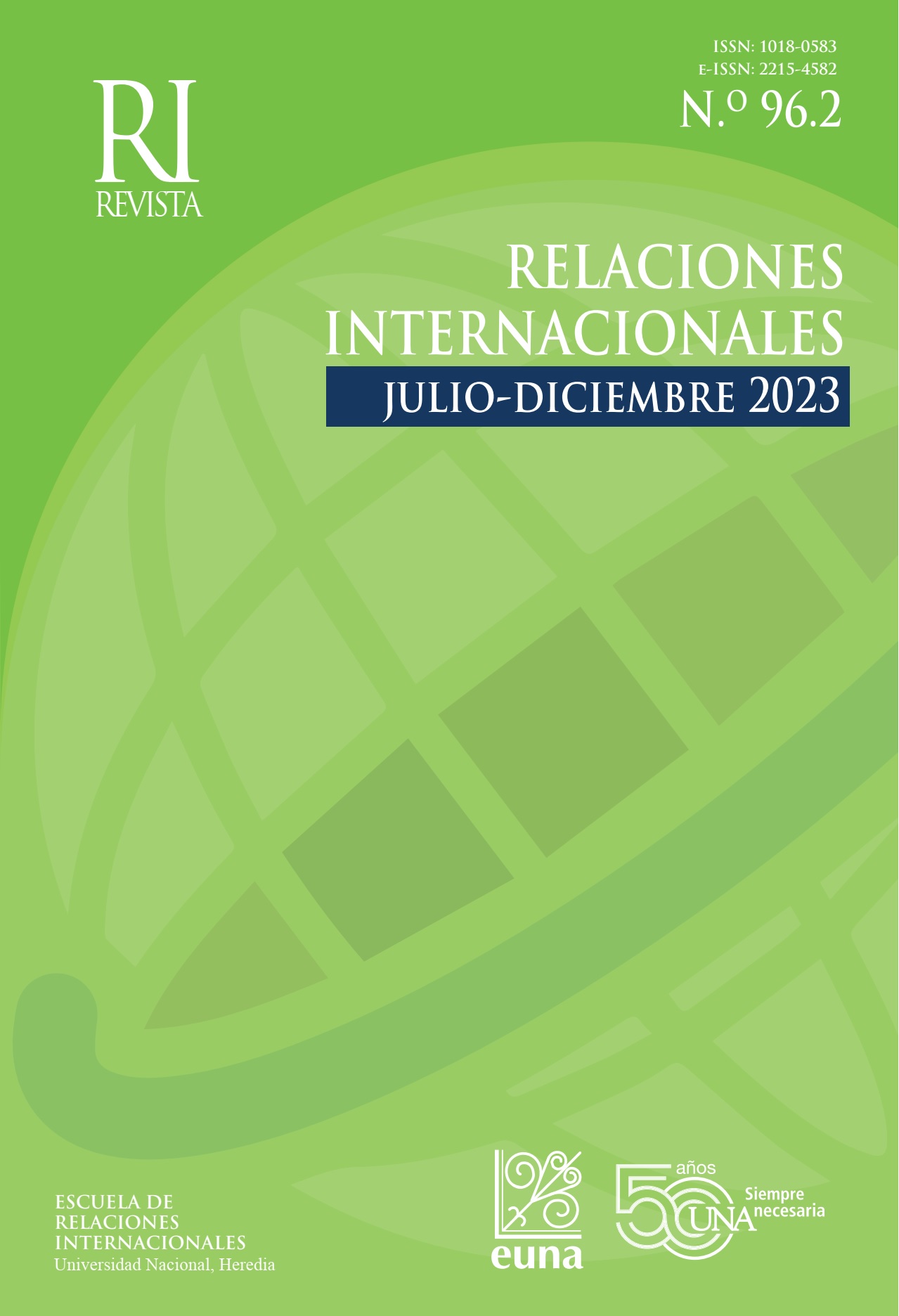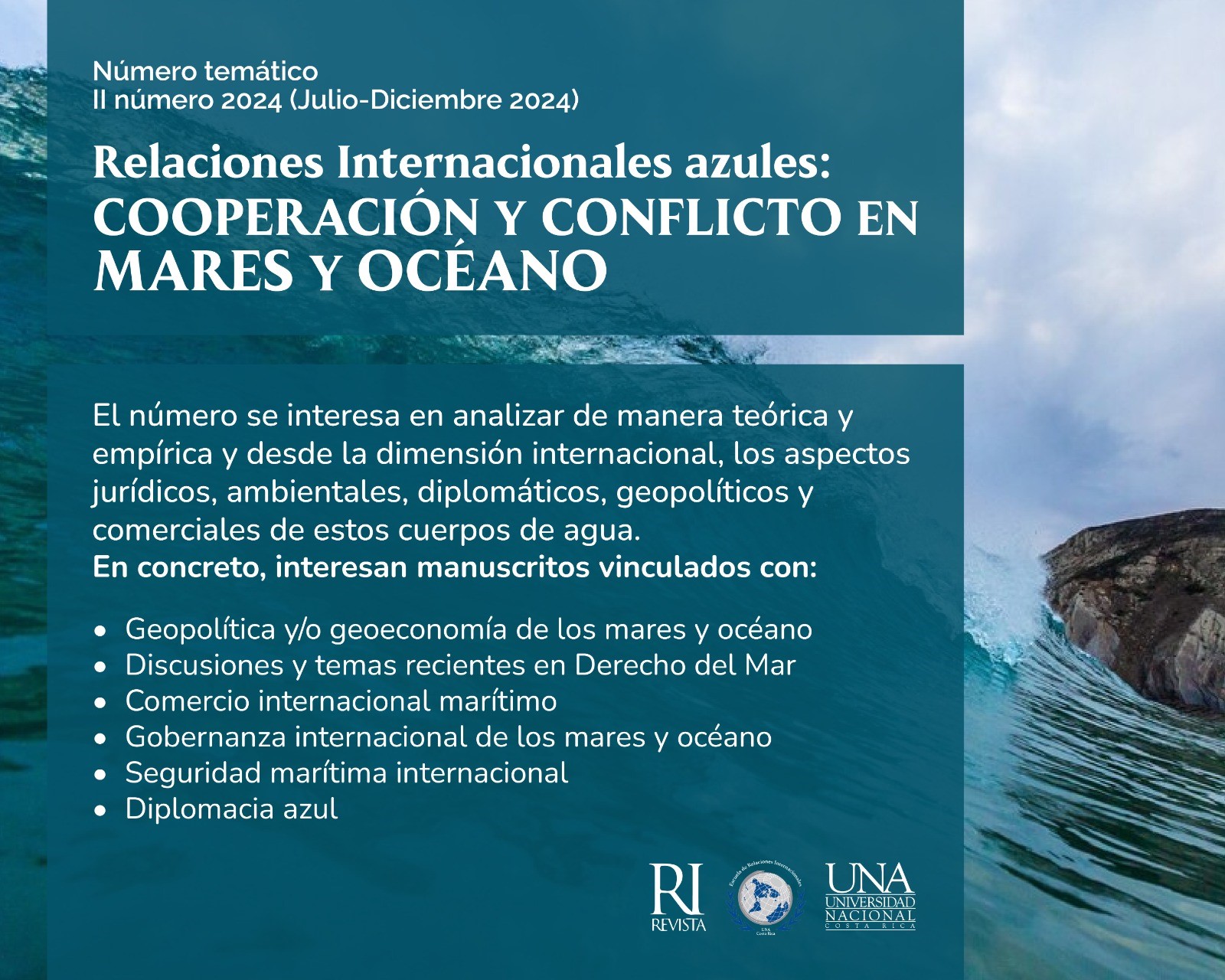Gobernanza ambiental y Relaciones Internacionales: Una revisión sistemática de teorías, métodos y problemáticas en publicaciones latinoamericanas
DOI:
https://doi.org/10.15359/ri.96-2.4Palabras clave:
Política ambiental, política ambiental internacional, política ambiental latinoamericana, revisión sistemática de literatura, política ambiental global, crisis ambientalesResumen
Hogar del Amazonas y de países con largas costas, la mayor parte de América Latina enfrenta una variedad de desafíos ambientales duraderos. Sin embargo, la producción académica de la región sobre política ambiental internacional está fragmentada y dispersa. El propósito de este estudio es analizar sistemáticamente la literatura sobre gobernanza ambiental en América Latina (2004-2023), con especial enfoque en teorías, métodos y problemáticas. Nuestra muestra incluye artículos publicados en revistas académicas indexadas, escritos en inglés, portugués o español, con el fin de responder a las siguientes preguntas. ¿Cómo puede la política ambiental latinoamericana contribuir a la comprensión de la gobernanza ambiental en la región y a nivel global? ¿Qué temas se han priorizado? ¿Qué teorías y métodos se han utilizado? ¿Qué vacíos quedan? Sugerimos una futura agenda de investigación y esperamos ayudar a fortalecer la literatura sobre gobernanza ambiental de las RI proporcionando insumos para mejorar la investigación en la región.
Referencias
Adamson, M., & Lalli, R. (2021). Global perspectives on science diplomacy: Exploring the diplomacy-knowledge nexus in contemporary histories of science. Centaurus, 63(1), 1–16.
Aguilar Cavallo, G.. (2020). El contenido y los alcances contemporáneos del derecho al acceso a la participación ambiental. Ius et Praxis, 26(2), 78-103. https://dx.doi.org/10.4067/S0718-00122020000200078
Alger, J., & Dauvergne, P. (2018). Researching global environmental politics: trends, gaps, and emerging issues. In A Research Agenda for Global Environmental Politics. Cheltenham, UK: Edward Elgar Publishing.
Andrade, J. C. S. (2009). Participação do setor privado na governança ambiental global: Evolução, contribuições e obstáculos. Contexto Internacional, 31,215–250.
Andrade, J. C. S., & Costa, P. (2008). Mudança climática, Protocolo de Kyoto e mercado de créditos de carbono: desafios à governança ambiental global. Organizações & Sociedade, 15, 29–45.
Andresen, S. et al. (Eds.). (2012). International Environmental Agreements. New York, Routledge.
Barbosa, F. B. B. (2023). O meio ambiente nas Relações Internacionais: uma análise a partir da obra de Robert Keohane. Recife, Universidade Federal de Pernambuco (Bacharelado em Ciência Política).
Barros-Platiau, A. F. et al. (2004). Meio ambiente e relações internacionais: perspectivas teóricas, respostas institucionais e novas dimensões de debate. Revista brasileira de Política internacional, 47, 100–130.
Biermann, F. (2014). Global Governance and the Environment. In: Betsill et al. (eds.) Palgrave Advances in International Environmental Politics. Palgrave Advances. Palgrave Macmillan, London.
Biggs, R. et al. (2021). The Routledge handbook of research methods for socialecological systems. Taylor & Francis.
Blackman, A. (ed.) (2021). Latin American and Caribbean forests in the 2020s: trends, challenges, and opportunities, IDB Monograph Inter-American Development Bank.
Borenstein, M. et al. (2021). Introduction to Meta-Analysis (2nd ed). Oxford, John Wiley & Sons, Inc.
Bredariol, T. D. O., & D’avignon, A. L. D. A.. (2018). Institutions And Environmental Governance: The Case of Environmental Permitting for Offshore
Oil And Gas Projects. Ambiente & Sociedade, 21, e00901. https://doi.org/10.1590/18094422asoc0090r1vu18L1AO
Breitmeier, H. et al. (2006). Analyzing international environmental regimes. From Case Study to Database. Cambridge, MA.
Carvalho, T. et al. (2021). “Mind the Gap”: Assessing Differences between Brazilian and Mainstream IR Journals in Methodological Approaches. Contexto Internacional, 43, 461–488.
Castro, F. D. et al. (2011). Governança ambiental na América Latina: para uma agenda de pesquisa mais integrada. Ambiente & Sociedade, 14, 1–13.
Chase, V. M. (2019). The Changing Face of Environmental Governance in the Brazilian Amazon: Indigenous and Traditional Peoples Promoting Norm Diffusion. Revista Brasileira De Política Internacional, 62(2), e008. https://doi.org/10.1590/0034-7329201900208
Choucri, N. (1993). Global Accord: Environmental Challenges and International Responses. The MIT Press, Cambridge.
Cia Alves, E. E. C., & Fernandes, I. F. D. A. L. (2020). Sustainable Development Goals: a change in scientific debate on development? Meridiano 47, 21.
Cia Alves, E. E. C et al. (2022). Como Fazer uma Revisão Sistemática da Literatura? Um Guia Prático em Governança Marinha In: I.F. Fernandes (org) Desafios metodológicos das políticas públicas baseadas em evidências. Boa Vista: Editora IOLE, pp. 67–117.
Dauvergne, P., & Clapp, J. (2016). Researching Global Environmental Politics in the 21st Century. Global Environmental Politics, 16(1), 1–12.
Delgado, N. A. (2016). Community protocols as tools for resisting exclusion in global environmental governance. Revista de Administração de Empresas, 56, 395–410.
Dias, I. Y. P. et al. (2023). Water–Energy–Food Security Nexus—Estimating Future Water Demand Scenarios Based on Nexus Thinking: The Watershed as a Territory. Sustainability, 15(9), 7050.
Domínguez, J. (2007). El funcionamiento del sistema de protección ambiental de la
Unión Europea: principios, instituciones, instrumentos. Estudios demográficos y urbanos, 22(3), 689–715.
EPI. Environmental Performance Index. (2022). Yale Center for International Earth Science Information Network Earth Institute, Columbia University. Available at: at: <https://epi.yale.edu/epi-results/2022/component/epi>.
Finnemore, M. & Sikkink, K. (2001). Taking stock: the constructivist research program in international relations and comparative politics. Annual review of political science, 4(1), 391–416.
Fonseca Lindao, G., Arroyo De La Ossa, M., & Castellanos Suarez, J. A. (2022). Gobernanza ambiental con enfoque étnico: una apuesta de gestión en áreas protegidas del Caribe Colombiano. Revista mexicana de ciencias agrícolas,13(5), 905-915.
Gadino, I., Sciandro, J.L., & Goldberg, N. (2022). Conflictos ambientales y participación social en torno al turismo residencial en Latinoamérica. Experiencias en Región Este, Uruguay. Investigaciones geográficas, (107), e60520. Epub 20 de junio de 2022. https://doi.org/10.14350/rig.60520
Gallagher, D. R. (Ed.). (2012). Environmental leadership: A reference handbook. SAGE publications.
Gómez, R., & Ferrero, B.. (2012). Gobernabilidad y ambientalismo en la selva Paranaense. Avá, (20), 00. Recuperado en 04 de noviembre de 2023, de
http://www.scielo.org.ar/scielo.php?script=sci_arttext&pid=S1851-16942012000100004&lng=es&tlng=es.
Hardin, G. (1968). The Tragedy of the Commons. Science, 162(3859), 1243–1248.
Harris, P.G. (Ed.). (2014). Routledge Handbook of Global Environmental Politics. Routledge.
Helm, C. & Sprinz, D. (2000). Measuring the Effectiveness of International Environmental Regimes. Journal of Conflict Resolution, 44(5): 630–652.
Hempel, L. C. (1996). Environmental governance: the global challenge. Island Press.
Hochstetler, K., & Inoue, C. Y. A. (2019). South-South relations and global environmental governance: Brazilian international development cooperation. Revista Brasileira de Política Internacional, 62.
Hochstetler, K. (2022). Brazil: A Boundary Case of Environmental Power. In: Falkner, R. & Buzan, B. (ed.) Great Powers, Climate Change, and Global Environmental Responsibilities, Oxford University Press, 116–138.
Hochstetler, K., Laituri, M. (2014). Methods in International Environmental Politics. Betsill, M. et al. (eds) Palgrave Advances in International Environmental Politics. Palgrave Advances. Palgrave Macmillan, London.
Hom, A. R. & Steele, B. J. (2016). ChiId’s play: Temporal discourse, counterpower, and environmental politics. In Aganthangelou, A. M. & Killan, K. D. Time, Temporality and Violence in International Relations. Oxon: Routledge, pp.189–204.
Hovi, J. et al. (2003). The Oslo-Potsdam Solution to Measuring Regime Effectiveness: Critique, Response, and the Road Ahead. Global Environmental Politics, 3(3) 74–96.
Hughes, H. et al. (2021). Global environmental agreement-making: Upping the methodological and ethical stakes of studying negotiations. Earth System Governance, 10: 100121.
Jacobi, P. R., & Sinisgalli, P. A. de A.. (2012). Governança ambiental e economia verde. Ciência & Saúde Coletiva, 17(6), 1469–1478. https://doi.org/10.1590/S1413-81232012000600011
Kilgour, M. & Wolinsky-Nahmias, Y. (2004). Game Theory and International Environmental Policy. In Sprinz, D. F. & Wolinsky-Nahmias, Y. Models, Numbers, and Cases: Methods for Studying International Relations. The University of Michigan Press, Ann Arbor, 317–343.
Kopra, S. (2020). Leadership in global environmental politics. Oxford Research Encyclopedia of International Studies.
Létourneau, A. (2014). The Problem of Expertise and the Question of Environmental Governance. Scientiae Studia 12 (3):535-548.
Lim, S. & Prakash, A. (2015). Quantitative Comparative Analysis, In Pattberg, P.& Zelli, F. (Ed.). Encyclopedia of Global Environmental Governance and Politics. Edward Elgar Publishing
Liscovsky, I., & Parra Vázquez, M. (2015). El papel de la información en la configuración de la gobernanza ambiental. Revista pueblos y fronteras digital, 10(20), 147-170. https://doi.org/10.22201/cimsur.18704115e.2015.20.36
Maliniak, D. et al. (2011). International Relations in the US Academy. International Studies Quarterly, 55: 437–464.
Martins, R. C.. (2015). Boundaries between inequality and difference in water governance. Ambiente & Sociedade, 18(1), 211–228. https://doi.org/10.1590/1809-4422ASOC952V1812015en
McGinnis, M. D. (1999). Polycentric governance and development: Readings from the workshop in political theory and policy analysis. University of Michigan Press.
Medeiros, M. et al. (2016). What does the field of International Relations look like in South America? Revista Brasileira de Política Internacional, 59.
Miles, E. L. et al. (2002). Environmental regime effectiveness: confronting theory with evidence. MIT Press.
Mitchell, R. B. & Bernauer (1998). T. Empirical Research on International Environmental Policy: Designing Qualitative Case Studies. Journal of Environment and Development.
_______(2004). Beyond Story-Telling: Designing Case Study Research in International Environmental Policy. In Sprinz, D. F. & Wolinsky-Nahmias, Y. Models, Numbers, and Cases: Methods for Studying International Relations. The University of Michigan Press, Ann Arbor, 81–106.
Mitchell, R. B. et al. (2020). What we know (and could know) about international environmental agreements. Global Environmental Politics, 20(1), 103–121.
Morin, J. F. & Orsini, A. (Eds.). (2020). Essential concepts of global environmental governance, 2nd edition, New York, Routledge.
O’Neill, K. et al. (2013). Methods and Global Environment Governance. Annual Review of Environment and Resources, 38: 441–471.
O’Neill, K. (2015). The environment and international relations. Cambridge University Press.
Ostrom, E. (1990). Governing the Commons: The Evolution of Institutions for Collective Action, Cambridge: Cambridge University Press.
Page et al. (2020). The PRISMA 2020 statement: an updated guideline for reporting systematic reviews. PRISMA. Available at: http://www.prisma-statement.org/
Passarelli, D. et al. (2021). Beyond Opportunism: The UN Development System’s Response to the Triple Planetary Crisis. United Nations University.
Pastrana B., E., & Pacheco R., Y. V. (2010). La Convención Ramsar a lo largo del eje local-global: protección de humedales en el Valle del Cauca. Papel político, 15(2), 571-616.
Paterson, M. (2014). Theoretical perspectives on international environmental politics. In: Advances in International Environmental Politics, London: Palgrave Macmillan UK, 45–77.
Pattberg, P. H. & Zelli, F. (Eds.). (2015). Encyclopedia of global environmental governance and politics. Edward Elgar Publishing.
Pereira, J. C. (2017). The limitations of IR theory regarding the environment: lessons from the Anthropocene. Revista Brasileira de Política Internacional, 60(1): e018.
Pérez Melchor, S. Y. (2019). Cambio climático en América Latina: política pública y legislación para la adaptación. Estado & Comunes, 1(8). https://doi.org/10.37228/estado_comunes.v1.n8.2019.109
Peyton et al. (2023). Cline Center Coup d'État Project Dataset. University of Illinois at Urbana-Champaign. https://doi.org/10.13012/B2IDB-9651987_V6
Purdon, M. (2015). Advancing Comparative Climate Change Politics: Theory and Method. Global Environmental Politics, 15(3): 1–26.
Robertson, R. (1992). Globalization: Social theory and global culture. London,UK: Sage.
Roger, C., Jordana, J., Holesch, A., & Schmitt, L. (2023). La investigación sobre gobernanza global. Explorando patrones de crecimiento, diversidad e inclusión. Foro internacional, 63(2), 213–249.
Rosete Vergés, F. A., Escalera-Matamoros, C., Ayala-Orozco, B., García-Frapolli, E., & Galán-Guevara, C. (2021). Transversalidad en políticas mexicanas de conservación de la biodiversidad: Coinbio y Corredor Biológico Mesoamericano. Economía, sociedad y territorio, 21(67), 775-802.
Sachs, J. D. et al. (Eds.). (2022). Ethics in Action for Sustainable Development. Columbia University Press.
Sampaio, D. P. (2022). Diplomatic culture and institutional design: Analyzing sixty years of Antarctic Treaty governance. Anais da Academia Brasileira de Ciências, 94, e20210539.
Santés Álvarez, R. (2004). Gobernación ambiental en México en el marco del TLCAN (1993–2003): el desafío de los residuos industriales peligrosos. Región y sociedad, 16(31), 03–38.
Santos, M., (2017). Global justice and environmental governance: an analysis of the Paris Agreement. Revista Brasileira de Política Internacional, 60(1), 1-18.
Sarfati, G.. (2008). Os limites do poder das empresas multinacionais: o caso do Protocolo de Cartagena. Ambiente & Sociedade, 11(1), 117–130. https://doi.org/10.1590/S1414-753X2008000100009
Schmidt, L.; Gomes, C. (2020). Mulheres e ambiente: Uma relação decisiva na transição para a sustentabilidade. Faces de Eva, n. 44, p. 65-87. Lisboa, Portugal, 2020. https://repositorio.ul.pt/handle/10451/52528
Sprinz, D. F. (2004). Environment Meets Statistics: Quantitative Analysis of International Environmental Policy. In Sprinz, D. F. & Wolinsky-Nahmias, Y. Models, Numbers, and Cases: Methods for Studying International Relations. The University of Michigan Press, Ann Arbor, 177–192.
Steiner, A. Q. (2011). O uso de estudos de caso em pesquisas sobre política ambiental: vantagens e limitações. Revista de Sociologia e Política, 19(38): 141–158.
Stevis, D. (2014). The trajectory of the study of international environmental politics. Betsill et al. (eds) Palgrave Advances in International Environmental Politics. Palgrave Advances. Palgrave Macmillan, London.
Stokke, O. S. & Underdal, A. (2015). Qualitative comparative analysis. In Pattberg, P. & Zelli, F. (Ed.). Encyclopedia of Global Environmental Governance and Politics. Edward Elgar Publishing, 148–155.
Sutton, A., Clowes, M., Preston, L. and Booth, A. (2019). Meeting the review family: exploring review types and associated information retrieval requirements. Health Info Libr J, 36: 202-222. https://doi.org/10.1111/hir.12276
Tricco et al. (2018). PRISMA extension for scoping reviews (PRISMA-ScR):checklist and explanation. Annals of Internal Medicine, 169(7), 467–473.
TNC Latin America Impact Report (2021). The Nature Conservancy (TNC). Available at: https://www.nature.org/content/dam/tnc/nature/en/documents/latinamerica/2021larannualreport_spreads_low.pdf
Vogler, J. (2003). “Taking Institutions Seriously: How Regime Analysis can be Relevant to Multilevel Environmental Governance,” Global Environmental Politics 3, 2, pp. 25–39.
Vos, A. de et al. (2019). Methods for understanding social-ecological systems: a review of place-based studies. Ecology and Society, 24(4).
Walsh-Führing, M.. (2018). The Brazilian Federal Government’s Role in the Prioritization of EU Foreign Direct Investment and its Environmental Agenda. Brazilian Political Science Review, 12(3), e0004. https://doi.
org/10.1590/1981-3821201800030004
World Bank. (2022). Finance for an equitable recovery. Washington: The World Bank.
Young, O. R. (Ed.). (1997). Global governance: drawing insights from the environmental experience. MIT Press.
_______. (2001) The Behavioral Effects of Environmental Regimes: Collective
Action vs. Social-Practice Models. International Environmental Agreements: Politics, Law and Economics, 1: 9–29.
_______.(2020) Global environmental governance studies. In: MORIN, Jean-Frédéric; ORSINI, Amandine (Ed.). Essential concepts of global environmental governance, 2nd edition, New York, Routledge.
Underdal, A. (2004). Methodological Challenges in the Study of Regime Effectiveness. In: Regime consequences. Springer, Dordrecht, 27–48.
Veiga, J. E. D.. (2017). The First Antropocene Utopia. Ambiente & Sociedade,20(2), 227–246. https://doi.org/10.1590/1809-4422ASOCEx002V2022017
Viola, E. & Franchini, M. (2012a). Sistema internacional de hegemonia conservadora: o fracasso da Rio+ 20 na governança dos limites planetários. Ambiente & Sociedade, 15, 01–18.
Viola, E. & Franchini, M. (2012b). Os limiares planetários, a Rio+ 20 e o papel do Brasil. Cadernos Ebape. BR, 10, 470–491.
Descargas
Publicado
Cómo citar
Número
Sección
Licencia
Esta publicación está adscrita a Creative Commons; deben respetarse sus atribuciones y restricciones.
Los autores/as que publiquen en esta revista aceptan las siguientes condiciones:
- Los autores/as conservan los derechos de autor y ceden a la revista el derecho de la primera publicación, con el trabajo registrado con la Licencia Creative Commons Atribución-NoComercial-CompartirIgual 4.0 Internacional, que permite a terceros utilizar lo publicado siempre que mencionen la autoría del trabajo y a la primera publicación en esta revista.
- Los autores/as pueden realizar otros acuerdos contractuales independientes y adicionales para la distribución no exclusiva de la versión del artículo publicado en esta revista (p. ej., incluirlo en un repositorio institucional o publicarlo en un libro) siempre que indiquen claramente que el trabajo se publicó por primera vez en esta revista.
- Se permite y recomienda a los autores/as a publicar su trabajo en Internet (por ejemplo en páginas institucionales o personales) antes y durante el proceso de revisión y publicación, ya que puede conducir a intercambios productivos y a una mayor y más rápida difusión del trabajo publicado.
Revista de Relaciones Internacionales por Universidad Nacional de Costa Rica está bajo una Licencia Creative Commons Atribución-NoComercial-SinDerivar 4.0 Internacional









.png)



2.png)
